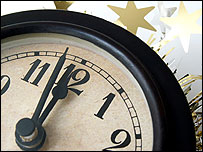Take Away English-New Year Celebrations 新年庆典(在线收听)

It's midnight - let's start kissing!
|
In recent years, street parties have become more popular. Hundreds, or even thousands of people gather in squares, main streets or on the river banks to listen to bands playing and to see fabulous fireworks displays.
For people who stay at home, most watch special, live New Year shows on TV and countdown, along with the presenters, from 10 to 1 as the last seconds of the old year tick away and the bells of the New Year are rung.
In Scotland New Year's Eve is called "Hogmanay". At midnight, people visit their neighbours and drink, dance and generally have a good time or have in Scottish what's called "a celeidhi" (pronounced "kay-lay").
If you're invited to a Scottish home on Hogmanay it’s important to know what to bring with you: a lump of coal, some shortbread and some whisky.
But what do these gifts mean? Well, the coal signifies warmth so you're wishing that the people you visit will have enough heat in the coming year. The shortbread, represents food, so you're hoping that the people will have enough to eat in the New Year. And the whisky? Well, that's easy. Some Scots call whisky "the water of life", so when you hand over your bottle to your hosts, it means you want them to have enough to drink over the next 12 months.
And you might think your duties as a guest end there. But there's one more key task you still have to perform if you can. The first person to knock on a neighbour's door (or "first foot" them as they say in Scotland), is supposed to be a tall, dark, handsome man. If you are, you'll bring good luck to the household. But what if that's not you? Well, don't ring the bell just yet. To make sure you don't bring bad luck to your friends, wait a while and the right person is bound to turn up soon!
|
GLOSSARY 词汇表 |
|
|
celebrations bells ring out at midnight river banks presenters New Year's Eve shortbread signifies the water of life hosts key task |
to dance the old year away squares count down tick away a lump of coal whisky the coming year hand over duties bound to turn up |